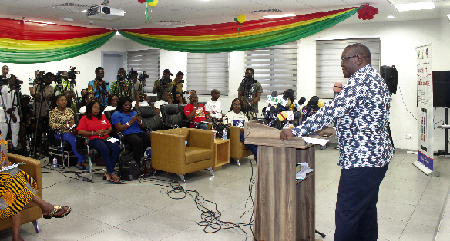
ghana news Ghana detected 16,650 TB cases in 2022
A total of 16,650 cases of tuberculosis (TB) were detected in the country last year.
This is an increase of 20 per cent of the 13,278 cases detected in 2021.
The Programme Manager of the National Tuberculosis Programme, Dr Yaw Adusi-Poku, who disclosed this at a press conference to mark World Tuberculosis Day 2023, yesterday, said the figure recorded for last year was due to the improvement of case finding activities in all the regions.
Quoting the World Health Organisation (WHO), Dr Adusi-Poku said it was estimated that 45,000 people in Ghana fell ill with TB in 2021 and 15,700 people died from the disease in that same year.
He said that meant that every day, 123 people in the country fell to TB in Ghana and 43 people died of it in the country.
"It means the disease is around. TB is real. People must know that the symptoms include coughing, weight loss, sweating at night even when it's cold, fever and loss of appetite. These are the symptoms families, schools, churches and Imams must know and make sure they come to the facilities for testing," he said.
World TB Day
March 24 every year is commemorated as World TB Day to raise public awareness about the devastating health, social and economic consequences of tuberculosis (TB) and to step up efforts to end the global TB epidemic.
This year’s theme: 'Yes! We can end TB!', aims to inspire hope and encourage high-level leadership, increased investments, faster uptake of new WHO recommendations, adoption of innovations, accelerated action, and multisectoral collaboration to combat the TB epidemic.
Making reference to an innovative special initiative by a consultant to diagnose TB in children in a tertiary hospital, Dr Adusi-Poku said the results showed that there were a lot of adults
with TB which had not been diagnosed in communities and were spreading the TB bacilli.
Treatment successes
Regarding standard treatment for TB patients, he said the country had done well with the success rate for cases having improved from 85 per cent in 2020 to 88 per cent in 2021.
“The Treatment success rate for Multi-Drug Resistant TB, that is patients who are resistant to our important first line medicines, treatment also improved from 64 per cent (2019 Cohort) to 77 per cent (2020 cohort). If we want to end TB, then we need a lot of advocacy, education and sensitisation to put TB high on the agenda of the general public,” he stressed.
He was grateful for the free enrolment of TB patients onto the NHIS, stressing that it had been a form of social protection for the patients and pointed out that the policy was still in force; therefore, health facility managers must ensure that all TB patients were enrolled.
The WHO Representative to Ghana, Dr Francis Kasolo, said through their technical support, leading advocacy and effective partnerships, enormous progress had been made over the past decade with high-burden countries such as Ethiopia, Kenya, Lesotho, Namibia, South Africa, Tanzania and Zambia, having surpassed or reached the 20 per cent target of reducing new TB cases.
However, he said, despite the progress, challenges in TB prevention and control remained, adding that there were still delays in TB diagnosis and testing.
“In Ghana, for example, out of the estimated 45,000 new TB cases, only 13,600 (30 per cent) are timely diagnosed and put on treatment. This means 70 per cent of Ghanaians affected by TB are not detected and put on life-saving medication,” he said.
Fighting TB
He said fighting TB required the concerted action of all sectors — from communities and businesses to governments and civil society, adding that they must all work together to develop innovative approaches to reaching vulnerable populations and ensure that they had access to quality TB care and management.
Speaking on behalf of the Minister of Health, a Deputy Minister of Health, Mahama Asei Seini, called on the private sector and civil society organisations to come on board to support the government to create awareness of TB to bring out the missing TB cases in the communities.
Mr Seini, who launched the programme, asked Ghanaians who show symptoms such as coughing, fever, weight loss and night sweats to report to the nearest health facility to be tested.
“ TB Is curable, treatment is free so get tested,” he added.
Other dignitaries at the programme included the Director of the Public Health Division of the Ghana Health Service (GHS), Dr Franklin Asiedu-Bekoe, who spoke on behalf of the Director General of the GHS; the Paramount Chief of Assin Kushea, who is also the National TB Ambassador, Nana Ehunabobirim Pra Agyinseim VI; the Programme Manager of the National AIDS/STIs Control Programme, Dr Stephen Ayisi Addo, development partners and CSOs.
